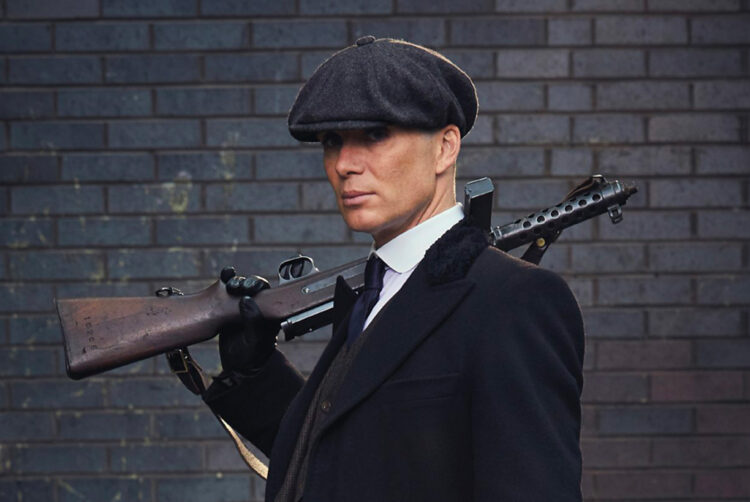Are TV commissioners relying too much on the same big names?

Opinion
Is it time to wean TV commissioners off the (mainly) boys club and cast the creative net a little wider, Stephen Arnell asks.
2023 is shaping up to be a bumper work year for prolific TV/movie scribe Steven Knight, of Peaky Blinders fame.
Knight has enjoyed ratings and (inexplicably) critical success last Autumn with his fanciful public school action series SAS: Rogue Heroes (BBC One) and decided to follow a wrist-slashing death metal version of Dickens’ A Christmas Carol (2019) with an adaptation of the author’s oft-told Great Expectations (more of which later).
Aside from that, he has no less than eight other scripting projects (and counting) in various stages of production, including a proposed movie remake of Hitchcock’s classic Vertigo, two-tone drama This Town and a Peaky Blinders film.
Oh, and a new Star Wars picture, presumably just to keep him out of mischief, the devil making work for idle hands and all that.
Knight is also setting up his own Digbeth Loc. Studios for TV and film production in Birmingham, which will even include a Brummagem branch of dated media hangout Soho House.
Not bad for a chap who began his writing career working with Brummie funnyman Jasper Carrott (The Detectives, Commercial Breakdown, Canned Carrott, and All About Me), and co-creating TV cash cow Who Wants to Be a Millionaire?, which should have set him up for life.
But, surely as Nemesis follows Hubris, it would be fair to say that Great Expectations has not been a universal hit with critics.
“Nobody wants a naked Mr Pumblechook and yet here we are, watching him getting sexual kicks from being whipped by Mrs Gargery the dominatrix,” said The Telegraph‘s Anita Singh of Episode Two. “Miss Havisham, one of the greatest creations in English literature, is now a smackhead. A seemingly respectable lady from the church is revealed to be a prostitute, hired by Miss Havisham to take Pip’s virginity on his 18th birthday. Writer Steven Knight has dreamt up scenes, characters, and dialogue that he would like to put in a drama – any drama – and inserted them into this one, just because he can.”
Christopher Stevens of the Daily Mail was no less cutting: “Every aspect of this adaptation is bad beyond belief, but most of all it brutally exposes the limitations of Steven Knight as a storyteller. The pacing is awful, with long dull stretches punctuated by overwrought moments. What wrecks it beyond salvage is Knight’s inability to create conflict between characters without resorting to sex, drugs, or violence.”
It seems that the heads of BBC Drama are loath to offer any notes on Knight’s work, or question why yet another version of Great Expectations was necessary, even with his Grand Guignol embellishments.
As he will adapt A Tale of Two Cities next for BBC One, we can probably look forward to a positive take on the guillotine-happy mob, hero Sydney Carton re-imagined as a hapless right-wing stooge/patsy and revolutionary crone Madame Defarge now a super-sexy freedom fighter.
Look on my Works, ye Mighty, and despair!
It’s not as though Knight has consistently hit home runs; his Apple TV+ sci-fi series See (2019-22) was mediocre, and movies Serenity (2019), Lockdown (2021), Allied (2016), Burnt (2015), The Girl in the Spider’s Web (2018) and Seventh Son (2014) were all box offices duds, poorly received by reviewers.
Indeed, Serenity (which Knight also directed) garnered some of the worst reviews for a recent star-laden Hollywood picture — probably why it was released as a Sky Cinema Original in the UK.
Writing in the London Evening Standard, Charlotte O’Sullivan called the movie a “hilariously terrible noir-cum-brainteaser from Steven Knight, starring Matthew McConaughey’s bottom.”
Knight defended his movie, not altogether convincingly/coherently: “With something like this, I wanted to not be in a genre, or to deliberately place it in a genre and pluck it out of it. So, I think whenever you do that, whenever you do something different, you divide the audience.”
One can only assume the creative paralysis which has infected director-geneal Tim Davie’s risk-averse BBC has now spread to BBC Drama series commissioning, where ‘safety first’ appears to be the watchwords.
But this approach isn’t confined to Knight, hence the repeated overusing a distinguished cadre of writers, given too much leeway either to indulge or repeat themselves, including Russell T Davies, Sharon Horgan, Jack Thorne, Sally Wainwright, Steven Moffatt, Jed Mercurio, and earlier Andrew Davies.
All each in their own way excellent writers, but far too ubiquitous.
You can’t make chicken salad out of chicken shit
Two busy writers I would exclude from this role call of talent are Matt Baker and Tony Jordan, the latter serving as an Icarus-style warning regarding those who hoover up too many TV scripting gigs.
Baker, a former Channel 4 PR guru, emerged as the one-man writing factory for Walter Presents’ drama label Eagle Eye Drama, scripting English language remakes of Professor T, Suspects and Before I Die, as well as his original BritBox series Hotel Portofino. None of which won rave reviews, with many quite scathing.
Regarding Suspects, in The Independent TV reviewer Nick Hilton commented: “The writing and plotting are so trite that the series almost has the timbre of parody. The dialogue ranges from the hackneyed to just plain weird, via the deeply terrible. It all has the feel of a not-terribly-competent first draft of a script written by someone who has acquired Nesbitt’s phone number and has 48 hours to cobble together a project for him.”
The hire of Marcella writer David Allison for upcoming Eagle Eye Euro-remake The Couple Next Door possibly confirms the acknowledgement that Baker needs to take on less. Or go on a script writing course. Or both.
After early success with peak period EastEnders, Jordan achieved TV ‘popular-auteur’ status with the likes of Hustle and Life on Mars. But overconfidence in his own abilities led to a string of high concept ‘passion project’ flops (Dickensian, Moving Wallpaper/Echo Beach), misconceived religious epics (The Nativity, The Ark) and attempts to recapture his former mainstream success (By Any Means, Hooten & The Lady).
Jordan now scripts and produces shows for Serbian and Saudi Arabian broadcasters. No doubt financially rewarding, but not the same as writing prestige TV dramas for the UK, is it?
Time to wean commissioners off the (mainly) boys club and cast the creative net a little wider?
 Stephen Arnell began his career at the BBC, moving to ITV where he launched and managed digital channels. He continues to consult for streamers and broadcasters on editorial strategy. He currently writes for The Spectator, The Independent, and The Guardian on film, TV and cultural issues. He is also a writer/producer (including Bob Fosse: It’s Showtime for Sky Arts) and novelist.
Stephen Arnell began his career at the BBC, moving to ITV where he launched and managed digital channels. He continues to consult for streamers and broadcasters on editorial strategy. He currently writes for The Spectator, The Independent, and The Guardian on film, TV and cultural issues. He is also a writer/producer (including Bob Fosse: It’s Showtime for Sky Arts) and novelist.



